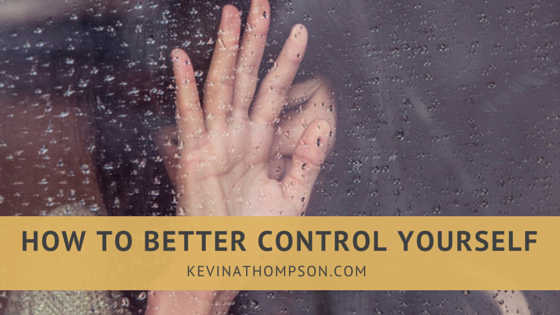Your actions and your attitudes. That’s it. You control nothing else. You have an influence on many other things—your health, friends, family, where you work, etc, but you only rule your actions and your attitudes.
And this is good news.
We foolishly believe if we controlled other things, life would be better for both us and others. However, we grossly overestimate our ability. Controlling ourselves stretches our capacity so that we have no other time or ability to oversee anything else.
But we try. (See: When Life Seems Out of Control)
Trying to control others diminishes our ability to control ourselves.
Our ability to govern ourselves is indirectly proportional to our attempt to control others. The more we try to control others, the less we can manage ourselves. The less we attempt to manage others, the more we control ourselves.
If you want to better control yourself, define what you can and cannot control.
The desire to control others often feels noble. We want what is best so we attempt to “help” others make better decisions. The difficulty is that our “help” is often manipulative, coercive, or enabling.
Instead of helping others, we feel responsible for the thoughts, feelings, or actions of others.
Instead of determining our own emotions, we mirror the emotions of others (if my child is sad then I’m sad, if my boss is angry then I’m angry, etc).
Instead of setting our own schedule, our lives are dictated by the perceived needs of others.
Instead of saying “no,” we say “yes” even though we don’t mean it, but out of a sense of duty we do what we don’t want to do. (See: You Chose This)
Instead of asking for help, we expect others to just know our needs as we think we know their needs.
Instead of allowing others to experience the negative consequences of their own decisions, we feel the need to rescue them while expecting them to make better decisions next time.
As we attempt to control the lives of others, we slowly lose control of our own actions and attitudes. Our satisfaction in life is determined by what others are doing, thinking, and feeling.
The way to better manage ourselves is to recognize we cannot control others.
We can help. We can offer our strengths and abilities. We can model wisdom and offer to do what we can do.
We can care. We can feel a deep sense of compassion and empathy for others. (See: You Hurt My Feelings)
But we can’t control. We can’t force people to make wise choices. We can’t remove every negative consequence of their decisions. We can’t feel a sense of responsibility for how other people think and feel (even how they think or feel about us).
Two Byproducts of Understanding Control
Whenever we understand what we do and do not control, we experience two natural byproducts.
1. Less guilt. A good amount of guilt which people face is false guilt. It is a negative emotion based on other people. If we believe we can control others, we will feel guilty when they make bad choices. Even though it isn’t our fault, we feel the blame. By understanding that we can’t control others, it frees us from the false guilt we often experience.
2. Empowerment. Ironically, understanding we don’t influence as much as we think empowers us because we understand what we do control. No matter the situation, we know we are in complete charge of our actions and attitudes. This feeling is empowering. No one can make me feel something or do something. In every circumstance, I control myself. (See: You Control What Matters Most)
Whenever I know myself, I’m well aware of my limitations. I know my responsibility to control my own actions and attitudes is time-consuming enough that I cannot expend any extra energy attempting to control others.
However, when I lose sight of myself and overestimate my ability and responsibility, I will attempt to control more things than I can. As I do, I will lose oversight over the one thing I have an opportunity to influence—me.
If you want to better control yourself, stop trying to control everyone else.




11 Responses to How to Better Control Yourself